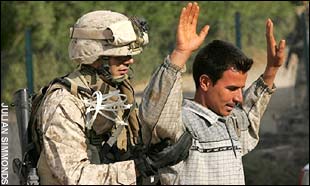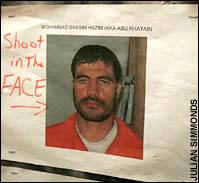Untitled Document
Iraqis, rather than foreign fighters, now form the vast majority of
the insurgents who are waging a ferocious guerrilla war against United States
forces in Sunni western Iraq, American commanders have revealed.
Their conclusion, disclosed to the Sunday Telegraph in interviews over 10 days
in battle-torn Anbar province, contradicts the White House message that outsiders
are the principal enemy in Iraq.

On patrol: An American marine searches an Iraqi
Of 1,300 suspected insurgents arrested over the past five months in and around
Ramadi, none has been a foreigner. Col John Gronski, senior officer in the town,
Anbar's provincial capital, said that almost all insurgent fighting there was
by Iraqis. Foreigners provided only money and logistical support.
"The foreign fighters are staying north of the [Euphrates] river, training
and advising, like the Soviets were doing in Vietnam," he said.
Although there are tensions between Iraqi insurgents and foreigners from the
group al-Qaeda in Iraq, led by the Jordanian zealot Abu Musab al-Zarqawi, there
are also alliances of convenience.
Col Gronski identified Mohammed Bassim Hazim, a former Ramadi taxi driver known
as Abu Khattab, as the leader of the town's insurgency. Abu Khattab has become
an "affiliate" of Zarqawi's group, many of whose members are Iraqis,
and has been responsible for most of the 1,770 attacks against US and Iraqi
forces in the past three months.
Ramadi, unlike neighbouring Fallujah, where 10 marines were killed by a bomb
on Friday, has never been taken over by rebels. But it remains disputed turf
at best. Thirty-four troops have died there since the beginning of September.
Insurgent casualties have been much heavier - more than 180 in the same period
in the town's eastern half alone.
American troop strengths have doubled in the past year with a US Army armoured
battalion now supplementing a US Marine light infantry battalion.
Lt Col Michael Herbert, a brigade intelligence officer, said Abu Khattab has
become an almost mythical figure. "He is the face of the insurgency in
Ramadi. He has been behind the majority of the attacks." He was arrested
by US forces last year but released, apparently due to lack of evidence and
because his significance was not then appreciated. His photograph shows him
wearing a Guantanamo-style orange jumpsuit.
The insurgents have the support of most locals. "They have the ability
to move freely around the city," said Capt Twain Hickman, the commander
of India Company of the 3/7 US Marines battalion. "That means they can
attack at a time of their choosing."

Most wanted: An American sniper's picture of Abu Khattab
Col Gronski said the local nature of the insurgency meant that even the few civic
leaders prepared to work with the Americans view the fighters as legitimate. "They
see them as resistance. They don't view these local guys placing IEDs [improvised
explosive devices] and firing mortars at us as insurgents."
Some Iraqis in Ramadi now adhere to Zarqawi's radical Islamist philosophy,
but for most the insurgency is about removing the occupiers, Col Herbert said.
"Their family and tribal honour has been impugned if we're on their ground.
They're almost duty bound to fight."
Unemployment, which is over 50 per cent, and widespread intimidation are also
fuelling the insurgency. "It's economic," said Lt Col Robert Roggeman,
who commands the 2/69 US Army battalion. "Two hundred bucks to shoot at
an American, 50 bucks to lay down an IED."
Iraqi officials who deal with the Americans are routinely killed. Ma'amoun
Salmi Rasheed, the governor of Anbar, has survived a dozen assassination attempts.
His predecessor and deputy were murdered. Little reconstruction is being done,
said Col Roggeman. "Here, it's security first."
The Pentagon plan for the country is to hand over "battle space"
to Iraqi forces once they are capable of combating the insurgency so that American
forces can withdraw. But this scheme has been beset by problems in Ramadi.
A year ago the local police force was disbanded because many of its members
were insurgents. In October, the provincial police chief was arrested on suspicion
of diverting salaries to fund the insurgency.
There are three Iraqi army battalions in the town, comprised mainly of Shia
troops from outside Ramadi, where the population is Sunni. If American troops
exit prematurely, this could be a factor in sparking a civil war.
Splits among insurgents, however, could assist the US aim to isolate Zarqawi's
group. Recent weeks have seen what the military terms "red on red"
gun battles between insurgent groups.
Bombs near houses and one that killed civilians on a bus prompted the clashes
and could have eroded Abu Khattab's support. "He is feared rather than
popular," said Col Herbert. "He might be overstepping the mark."
But the commander of one of the Iraqi battalions, who asked not to be named
for fear of reprisals, said it would be "at least two or three years"
before his men were ready to fight alone.
"The terrorists control Ramadi and the mosques assist them," he said.
"We are getting better but the Iraqi army is still weak and we need equipment.
We always rely on the Americans to do the hardest jobs for us."
Each week, US forces achieve successes. In the recent Operation Machete, Capt
Hickman's men uncovered an Aladdin's cave of arms buried in caches close to
the banks of the Euphrates.
There had been intelligence that the munitions were being transported across the
river on small boats. But since Iraq still has huge stockpiles of weapons from
the Saddam era, insurgents are unlikely to run out of supplies.
"These insurgents have a great deal of tactical and operational patience,"
said Col Gronski. "They will continue to look for the time and the place
because time is on their side."

